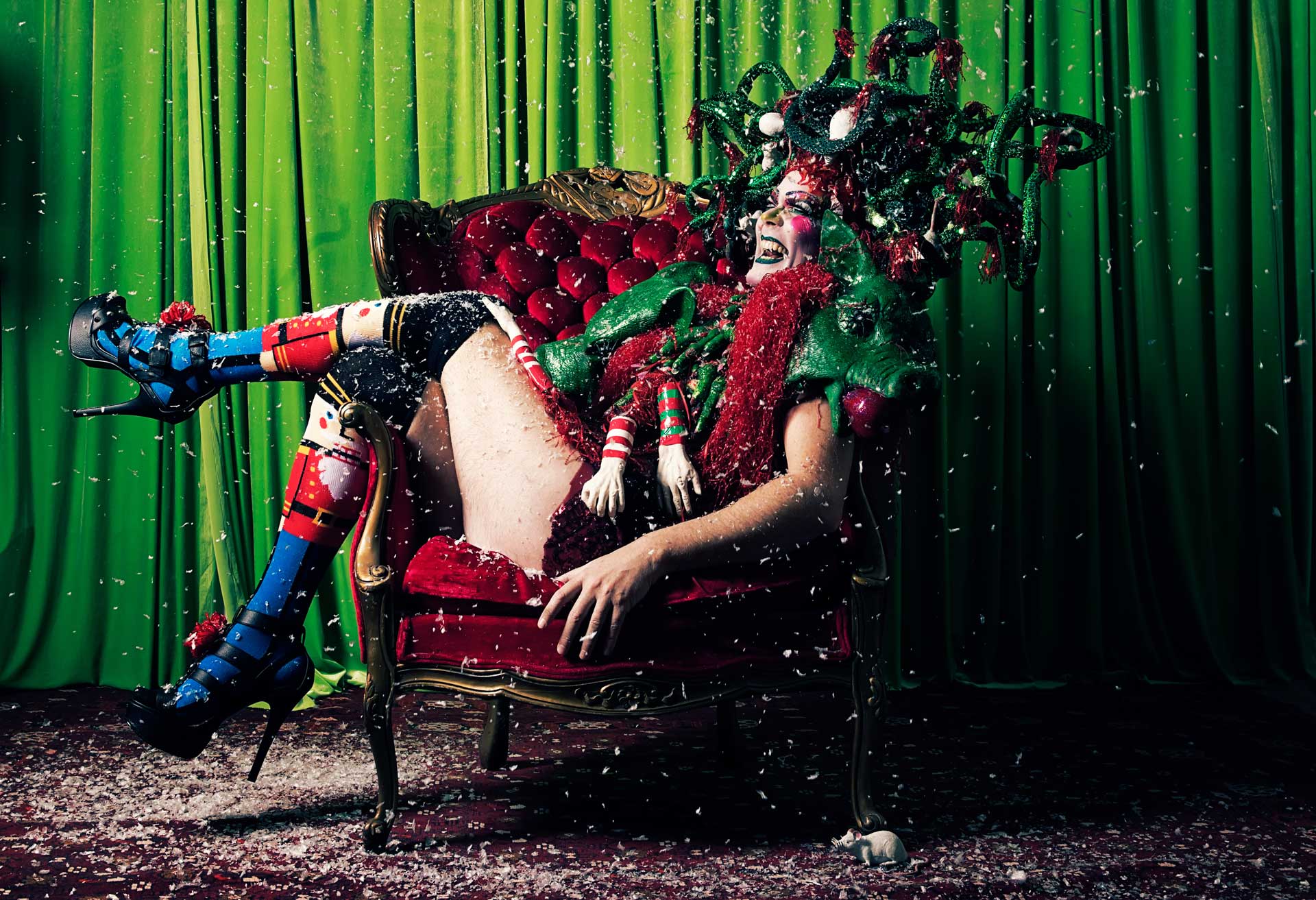
Watching Taylor Mac and cohort wield their erotic politics (Erolitics? Ignore me….) with such panache, I was reminded of several texts I studied as a politics major in college. Additionally, I was inspired by two connected, very of-the-moment issues: gender and self-care. (Body politics in the Body Politic. Get it? OK, I’m done.) What followed was a ramble through many of the articles, books, and other brain food I’ve been enjoying lately—a fun game of connecting the dots.
Inspired by Taylor Mac's Holiday Sauce... Pandemic!
A recent article in National Geographic listed which animals do well in "the mirror test”: dolphins, elephants, magpies and chimpanzees all passed with flying colors. Like humans, each showed an ability to recognize their own reflections, indicating a level of self-awareness. It creates a charming image: a circle of white-coated scientists studying flamingoes, puppies, and panda bears as the animals explore their reflections for the first time. Despite the glancing whimsy of this study, one line from the article struck a nerve: “Humans are the only creatures that find fault in their reflection.”
This psychological quirk is rooted in that most omnipotent of human inventions, late-stage capitalism. The German philosopher and social critic Herbert Marcuse wrote in 1955’s Eros and Civilization of the capitalist usurpation of sexuality. If a person is taught that whatever current state they’re in is lacking—not stylish enough, thin enough, young enough, etc. etc.—that consumer will sink vast sums of money into reaching the ideal, making them more attractive to the opposite sex . This ideal—set by narrow colonial and heteronormative standards and blasted in every magazine, storefront, and influencer’s feed—must be set just high enough to never be attained.
Gwyneth Paltrow has built an empire by capitalizing on our inadequacies. ($630 cotton-blend sweatpants? One ounce of face cream infused with diamonds and butterfly tears? Sure, just hold the pearl-dusted kale salad.) Make no mistake, I love a luxurious serum and green juice as much as the next millennial. But I’ve noticed that it’s only when my self-esteem has been at its lowest that these products feel essential for wellbeing. In the angst-ridden quicksand of my early 20’s, nothing was too woo-woo in my quest for “wholeness”: I went vegan, then paleo; tried intermittent fasting, hot yoga, and drank celery juice on an empty stomach; sat cross-legged on a cold floor while a retired software engineer named Karen beat a drum and sang to stimulate “auric ancestral healing”. (And yes, pearl dust is a real supplement, and yes, I have whirled it into a smoothie in pursuit of an “ethereal glow.” Spoiler alert: it didn’t work.) These tools can do good, but the good intentions weren’t there. This routine was exactly as exhausting as it sounds.
Despite the vast stores of mental energy this “lifestyle” consumed, it also conferred a glow that only money can buy: false superiority. Despite being lightyears away from zen-like bliss, according to the goals laid out by society, my labor of self-love was moral and good. In this mindset, self-care morphs from because I’m worth it to I’m worthless without it.
Much ink has been spilled on the dangers of self-optimization. When American materialism and age-aversion meet the puritanical values of self-improvement and self-examination, a perfect storm ensues. The LGBTQ community that Taylor Mac belongs to projects an alternative.
In the 1970s and 80s, the gay community took up self-care in defiance against a society that rejected them. Anyone who has taken a freshman women’s studies course will be acquainted with queer black activist Audre Lorde’s famous quote: “Caring for myself is not self-indulgence, it is self-preservation, and that is an act of political warfare.” With his writings against sexual repression, the aforementioned Marcuse became an unlikely hero for the gay rights movement. The Gay Liberation Front even adopted a Marcuse line as their motto, in tones similar to Lorde’s 1988 quote: “Today, the fight for life, the fight for Eros, is the political fight.”
Taylor Mac’s work beats with the same heart. Their generous love radiates from the screen, divergent and defiant. In the Holiday Sauce...Pandemic! lineup, classic songs of hetero-love are reborn as celebrations of the body and pleasures of the flesh. Indeed, most bodies on show are not the taut and optimized femme-bots of the Goop glitterati. Every mark and jiggle and “non-binary breast” confronts the audience’s narrow views of how beauty should look. Liberation can be found by embracing figures that defy definition.
Visual cues support this. Mac’s opening tableau, peppered with phallic fruit, is bursting with sensual life. The dense confections of makeup and costume throughout the show careen from glamorous to grotesque, again pushing the boundaries of conventional beauty. This counterculture is represented down to the tiniest details: a plastic water bottle sprouting in Mac’s Carmen Miranda-style headdress; a hole winking from the right thumb in Mac’s sequined glove. To some, this might look shabby. To Mac, it’s tongue-in-cheek.
For many of us, caring for ourselves manifests as touch: a hug or massage from a loved one or a cuddle-fest with our pet. Perhaps this is nowhere more pronounced than in the queer and drag communities. The Holiday Sauce performers are affectionate, erotic, and warm, large in their gesticulations like an Italian nona.
Writing this, I’m reminded of a study on human touch that I recently learned about. Researchers at the University of Chicago compared the public body language of young couples in Britain, Germany, and America with counterparts in Italy, Spain, and France. Unsurprisingly, the more hot-blooded cultures of the European continent were all over each other. Those of Anglo-Germanic extraction turned to self-touch: hugging arms close, fidgeting, playing with their hair. Making up for the public displays of affection that are mostly frowned upon. Even more poignant were the study’s findings on aggression. Less affectionate cultures were more likely to be aggressive— verbally and physically, towards others and themselves.
It’s not hard to imagine that France, Italy, and Spain have struggled to contain Covid-19 due in part to their culture of touch. The study suggested that the mental health of these countries’ peoples have also suffered in the absence of touch (What are the French without faire la bise?). Are we on the fast track towards a world that’s even more touch-deprived than before the pandemic? Or will we recognize our deep need for affection and self-love…in order to be a bit more happy and gay?
Heteronormative folk have something to learn from the antics of Holiday Sauce. By taking up space with affectionate gestures and smashing expectations, each performer joyfully gives themselves the love they’ve been denied by others. If we could be more sensitive and authentically loving to ourselves—self-care in the truest sense of the word—then outside sources of validation—like buying the next shiny thing or losing 10 pounds—might fall away. Maybe then, we’d look in the mirror and like what we see.


